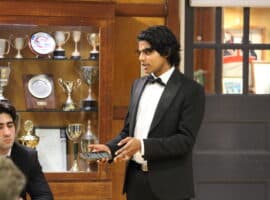Debating
Debating is a skill and an art which uniquely brings together reading, thinking and speaking. Testing both depth of knowledge and the facility for reasoning, it is a proven means of putting bright boys on their mettle.
While knowledge is the foundation of an academic education, without debating skills its value is circumscribed, since the ability to evaluate others’ arguments and then conceive and articulate one’s own is so often the key to thinking well. Effective questioning, critical thinking and logic are all developed through debating, and formal debates also teach boys the specific rhetorical skills necessary to challenge or defend a motion. In addition, debating and public speaking help foster confidence and social poise; they are thus essential skills for leadership.
Prized in antiquity, debating remains no less relevant today: many of our most illustrious Old Elizabethans speak of the importance to their careers of the experience gained through debating and public speaking at QE. Skill in debating is, of course, a sine qua non for any boy who aspires to a career which involves carrying an audience, such as the Law or politics.
Debating is offered as an extra-curricular activity throughout the School, from Year 7 upwards, and prizes for public speaking or debating are presented at both our Junior and Senior Awards ceremonies. Homegrown opportunities include an inter-House debating competition, together with other events tailored to particular year groups. For senior boys, the Elizabethan Union, the School’s formal debating society, was re-established a few years ago. The Union’s Annual Dinner Debate is a highlight of the calendar, pitting two Year 12 boys against a pair of Old Elizabethans – “the Visitors” – before an audience of their peers. It ensures that, regardless of their backgrounds, all our sixth-formers can experience a formal, black-tie occasion before they go to university.
In addition, the School is an active and successful participant in a large number of external debating competitions, which bring together pupils from many of the country’s leading schools. These vary considerably in format and subject matter. There are those that are emphatically political and international in nature – including the European Youth Parliament and the Model United Nations. And there are more general debating contests, such as: the country’s oldest schools competition, the English-Speaking Union’s Mace; its biggest, the Oxford Schools’, run by the Oxford Union, and the similarly prestigious competition run by the Cambridge Union.





